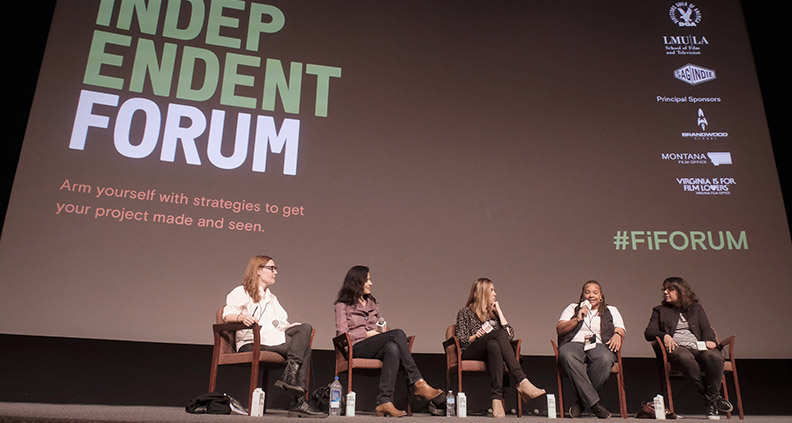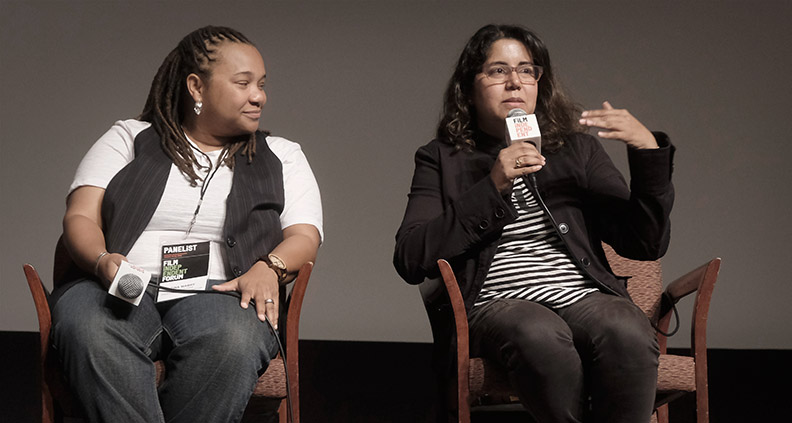You can watch the panel—Sustaining a Creative Career: A Filmmaker’s Balancing Act—in its entirety below or on our YouTube channel.
The filmmakers—Cherien Dabis, Tina Mabry, Sian Heder and Nisha Ganatra—each acknowledged the difficulties of working in the industry and in many ways, their stories were similar. Each had a sudden realization that storytelling was something they could do as a career. Each went to film school and then wrote and shot features, all of which found success at film festivals. And each one experienced layers of frustration, disappointment and bewilderment along the way. Happily, all four are currently writing, directing and producing for popular TV shows—so something good must have happened. But looking back, here’s are some key pieces of advice that they would give to their younger selves: “I got really lucky at [my college] Columbia,” said Dabis (Amreeka, Empire). Her Palestinian family was not supportive of her decision to quit med school and make movies, but a close friend of hers had directed The L Word pilot for Showtime. When the show needed a junior writer who knew about the Iraq war, the friend immediately thought of Dabis. The L Word creator Ilene Chaiken went on to become a showrunner for Empire. Having nurtured a relationship with Chaiken, Dabis found herself with a staff position on the show, one of last year’s biggest hits. To this, Ganatra (director of many Transparent episodes) cited Amy Poehler’s book Yes, Please, which wryly encouraged readers that if you work really hard, after 16-18 years one of your friends will get famous enough to hire you! So there’s that. Sian Heder (Orange is the New Black, Tallulah) noted a common thread among the panelists, “We all made feature films that were very personal, very true to our voice and our experience.” Heder attributes everything in her TV career to her feature script, saying that it was imperative that she knew who she was and what she was bringing to the table. Drawing on her NYU education, Ganatra added, “We were taught, ‘Don’t add to the crap out there, do something new,’” which kept her grounded and focused on what exactly she wanted to say—to add to the culture, rather than piling on more noise. “All the ‘No’s’ don’t matter, it’s the one ‘Yes’ that counts!” quipped Tina Mabry (Queen Sugar, Mississippi Damned). She added that believing in yourself as an artist is key. If you don’t believe in what you’re doing, you can’t sustain it. “It’s about continuing to get better.” Heder quoted a phrase whose source is unknown: “Success in Hollywood is like winning a pie-eating contest. Where the prize is more pie.” Looking back on her first years in Los Angeles, she urged her former self to write that beautiful movie, to take advantage of the freedom you have before success that you don’t really have after success. “Enjoy the ‘being poor’ artist part of it—it’s a fertile, creative time,” she said. “When I wasn’t working, I was always working!” said Dabis, remembering her unending dedication. Constantly pushing to churn something out, she found the fruit of her labor had suffered. Instead, she would tell herself to relax and enjoy her life a bit more, to trust that things happen when they’ll happen. And to be a bit pickier about where to devote all that hard effort. “Choose projects that really matter to you.” Learning to say “no” rather than spreading her focus too thinly—a hard-won insight. Maybe it isn’t a surprise to learn that an all-female panel has struggled with the decision to add kids into the mix. “Even if your partner is completely supportive, for some things the mom is just needed,” said Heder, who has two toddlers at home. Having delayed pregnancy several times in anticipation of her feature being made, and then the feature being delayed several times, Heder wound up having a baby the night her film was picture-locked. “It is hard to do all of it,” Heder admitted. “You feel like you’re failing at everything. But there’s something very creative about making a baby and making a movie at the same time.” Mabry shared her misgivings about waiting so long. “I took away ten years focusing on my career. And it’s scary as hell!” But ultimately she wished she hadn’t delayed because of fear. After hearing Heder and Ganatra tell stories of navigating prejudice, nursing on location scouts and bringing their kids to set, Dabis announced, “You guys are really inspiring me!” To which Mabry added that she would be bringing her kids to set. “You have to,” Ganatra added “You won’t see them otherwise!” And after all the labor, juggling, waiting, creating, succeeding, failing and sweat—is it worth it? Absolutely, says Ganatra. “I never thought I could be at studio lots, directing. When I pull up to the gates and they ask for my ID, a little part of me is still like, ‘Oh my God! They’re letting me in, that’s so amazing!’”
The 2016 Film Independent Forum happened from October 21-23 at the Directors Guild of America in Los Angeles. Not a Member of Film Independent yet? Become one today. The 2016 Film Independent Forum is supported by Premier Sponsors Directors Guild of America, Loyola Marymount University School of Film and Television and SAGindie, with Principal Sponsors Brandwood Global, Montana Film Office, and The Virginia Film Office. (header, L-R: Mabry, Ganatra, Dabis and Heder)

